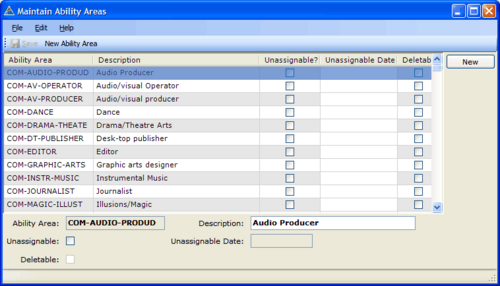Example: Simple Maintain Table Screen: Difference between revisions
No edit summary |
No edit summary |
||
| Line 1: | Line 1: | ||
==Example Screen== | ==Example Screens== | ||
There are two example screens for two different scenarios: the first one needs to be used for DB Tables where the Primary Key is a String, the second example for for DB Tables where the Primary Key is a number. | |||
===Example Screen Where the Primary Key of the DB Table is a String=== | |||
The example screen can be found here: | The example screen can be found here: | ||
U:\openpetraorg\csharp\ICT\Petra\Client\lib\MPersonnel\gui\setup\AbilityAreaSetup.yaml | U:\openpetraorg\csharp\ICT\Petra\Client\lib\MPersonnel\gui\setup\AbilityAreaSetup.yaml | ||
| Line 7: | Line 10: | ||
[[File:Maintain_Table_Screens_-_simple_example.png|500px|thumb|center|Simple Maintain Table Screen Example]] | [[File:Maintain_Table_Screens_-_simple_example.png|500px|thumb|center|Simple Maintain Table Screen Example]] | ||
When copying the example | ===Example Screen Where the Primary Key of the DB Table is a Number=== | ||
Those screens are marked with '(*5)' in the 'Comment' column! | |||
The example screen can be found here: | |||
U:\openpetraorg\csharp\ICT\Petra\Client\lib\MPersonnel\gui\setup\AbilityLevelSetup.yaml | |||
U:\openpetraorg\csharp\ICT\Petra\Client\lib\MPersonnel\gui\setup\AbilityLevelSetup.ManualCode.cs | |||
That's how it looks like: | |||
TODO | |||
==How to Copy the Example Screens== | |||
When copying one of the example screens as a starting point for the individual Maintain Table screens the layout does not need to be changed because it is identical for all of the screens. There is only one exception to that for the screens where the Primary Key of the DB Table is a string: the width of the TextBox for the 'Code' (=the first TextBox in the Detail Panel) as the number of characters which can be entered there is varying for each of the screens [see DB definition '<code>varchar(X)</code>', where ''X'' is the number of characters allowed]: | |||
* don't specify a width if the varchar value is greater than 10, we will go with the default with (which is 150 pixel) in this case; | * don't specify a width if the varchar value is greater than 10, we will go with the default with (which is 150 pixel) in this case; | ||
* if the varchar value is lower than 10: specify a width that allows the number of characters to be displayed ('<code>Width=xxx</code>'. | * if the varchar value is lower than 10: specify a width that allows the number of characters to be displayed ('<code>Width=xxx</code>'). | ||
* For the screens which are marked with '(*5)' in the 'Comment' column: make the 'Code' TextBox as wide as needed for displaying two-digit numbers (the maximum value is '99' for those TextBoxes). | * For the screens which are marked with '(*5)' in the 'Comment' column: make the 'Code' TextBox as wide as needed for displaying two-digit numbers (the maximum value is '99' for those TextBoxes). | ||
Revision as of 21:38, 8 January 2011
Example Screens
There are two example screens for two different scenarios: the first one needs to be used for DB Tables where the Primary Key is a String, the second example for for DB Tables where the Primary Key is a number.
Example Screen Where the Primary Key of the DB Table is a String
The example screen can be found here:
U:\openpetraorg\csharp\ICT\Petra\Client\lib\MPersonnel\gui\setup\AbilityAreaSetup.yaml U:\openpetraorg\csharp\ICT\Petra\Client\lib\MPersonnel\gui\setup\AbilityAreaSetup.ManualCode.cs
That's how it looks like:
Example Screen Where the Primary Key of the DB Table is a Number
Those screens are marked with '(*5)' in the 'Comment' column!
The example screen can be found here:
U:\openpetraorg\csharp\ICT\Petra\Client\lib\MPersonnel\gui\setup\AbilityLevelSetup.yaml U:\openpetraorg\csharp\ICT\Petra\Client\lib\MPersonnel\gui\setup\AbilityLevelSetup.ManualCode.cs
That's how it looks like:
TODO
How to Copy the Example Screens
When copying one of the example screens as a starting point for the individual Maintain Table screens the layout does not need to be changed because it is identical for all of the screens. There is only one exception to that for the screens where the Primary Key of the DB Table is a string: the width of the TextBox for the 'Code' (=the first TextBox in the Detail Panel) as the number of characters which can be entered there is varying for each of the screens [see DB definition 'varchar(X)', where X is the number of characters allowed]:
- don't specify a width if the varchar value is greater than 10, we will go with the default with (which is 150 pixel) in this case;
- if the varchar value is lower than 10: specify a width that allows the number of characters to be displayed ('
Width=xxx'). - For the screens which are marked with '(*5)' in the 'Comment' column: make the 'Code' TextBox as wide as needed for displaying two-digit numbers (the maximum value is '99' for those TextBoxes).
Methods in the ManualCode.cs file
- '
RunOnceOnActivationManual': This Method needs to be in the ManualCode.cs file but you don't need to change anything in that Method. - '
EnableDisableUnassignableDate': This Method needs to be in the ManualCode.cs file but you don't need to change anything in that Method. - '
GetDetailDataFromControlsManual': This method needs to be left out of all ManualCode.cs files except for the ManualCode.cs files of screens where this manual assignment is needed (for instance in screen 'Positions').
See this wiki section for an explanation of these Methods.
